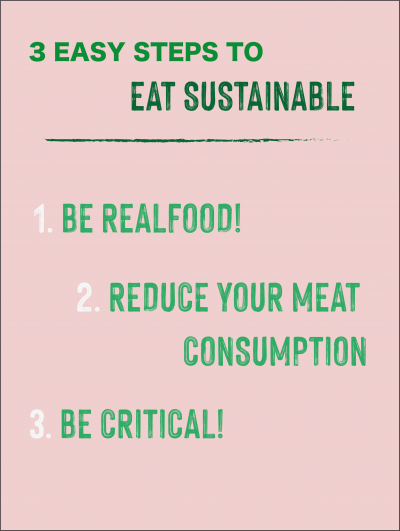
HOW TO EAT SUSTAINABLE
Three easy steps to eat sustainable
Easy steps to eat sustainable
Have you ever heard the sentence “You are what you eat”? Well, it is true. If you eat healthy, you will probably be healthy, and if you don’t, you will probably not be healthy. Makes sense, right?
However, this idea goes beyond. What you eat is not only what you are physically, but it also shapes your values. For example, if you have a vegetarian diet, it is probably because you are an animal lover, and you don’t want to kill any animals; or if you don’t consume palm oil, it is probably because you want to avoid deforestation; or if you don’t support a certain industry, you will probably not consume products made there. And like those examples that have been exposed, there are thousands.
So, if you are a sustainable person, and you want to have a sustainable life-style, why not begin by eating sustainable?
Here there are some tips to eat more sustainable:
1. BE REALFOOD!
The Realfooding is a movement founded by the nutritionist Carlos Ríos. He defends that people cease to eat ultra-processed food, and begin eating more real-food, which is basically the food people used to eat 50 years ago, the food our grandparents cook for us. Being Realfood is not eating precooked food and doing it yourself, for example. Carlos Ríos explains that in the last decades, there has been an exponential growth in the consumption of ultra-processed food and that it is related to the growth of many illnesses. Moreover, the industries of ultra-processed food pollute the environment. That is why, choosing to be Realfood, is the more sustainable option for eating.
You can find more about Carlos Ríos and the Realfooding movement on his Instagram @carlosriosq, and you can find many Realfood recipes on the Instagram @realfooding.
Moreover, if you are really interested in this movement, I highly recommend you the book written by Carlos Ríos, Eat Real Food.
2. REDUCE THE CONSUMPTION OF MEAT
There is an article in the journal The Guardian, which is called Huge reduction in meat-eating “essential” to avoid climate breakdown (you can access from this link https://www.theguardian.com/environment/2018/oct/10/huge-reduction-in-meat-eating-essential-to-avoid-climate-breakdown), in which it is explained as the headline says, that if the consumption of meat in the world does not decrease, there will be irreversible impacts on Climate Change.
The meat industry has many impacts:
- It has an environmental cost, as these industries are responsible for the 14.5% of the total greenhouse gas emissions. Moreover, the land is being exploited so much that there will be a point in which we will not be able to grow crops.
- It has costs for our health. Animals are given antibiotics in intensive farming, and later, when people consume meat, they are also consuming those antibiotics. Moreover, it has been demonstrated that for an adult person, 500 grams of meat per week is enough, so people are also consuming more meat than they need.
- Finally, it has a cost for animals. Many animals are being killed in horrific ways, so we can eat their meat.
With this, it is not being said that people have to stop having meat, but that people must reduce its meat consumption.
3. BE MORE CRITICAL
Research more about what you eat, and the origin of that food. Search the industries to which you buy your food, and try to choose always those industries that are more sustainable. If in the research process you see something you don’t like about a product, be critical and stop consuming it!
By following these steps, you can eat more sustainable, without making really big changes in the way you eat now. If you want a cake, instead of buying it, choose the sustainable and Realfood option and do it yourself! If you want meat, think that you need to eat less, and that maybe you could choose a substitute of it. And finally, make research, and know what are you eating and where it is coming from!
If all of us adopt this kind of little changes to make our life more sustainable, we can make a big change in the world!

